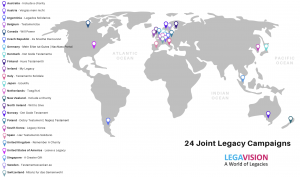
Patrick Gibbels: EFA joins consortium working to further strengthen EU Directive on cross-border associations
November 8, 2023
Damian O’Broin: Why experienced fundraisers need to stay open to new ideas
December 13, 2023Legavision coordinator and consultant at Legacy Futures, Lena Vizy writes about the shift towards supporter-centred legacy fundraising and the importance of understanding the motivations behind gifts in wills for creating a lasting impact.
We’ve been talking about how important it is to be donor-centred in fundraising for a long time now. I strongly believe in this and even more so when it comes to legacy fundraising, I’m absolutely convinced that we need to put supporters at the centre of our efforts to build successful legacy fundraising programmes. But what does that mean, and most importantly how can we practice what we preach?
Shifting the focus to supporter-centred legacy fundraising
Firstly, let’s clarify why we emphasize being supporter-centred in legacy fundraising rather than solely donor-centred. It’s quite simple: not all potential legators are active donors in the traditional sense. A lot of potential legacy givers are not to be identified in your donor database. Research conducted by Legacy Foresight indicates that, on average, 52% of legacy donors in the UK were not previously known to the organisation. In the Netherlands, this percentage is even higher (56%).
So, it’s crucial to broaden our perspective and not solely focus on existing donors but to recognize and engage with a more extensive group. Legacy Foresight’s UK research on “invisible legators” highlights that people who pledge to leave a gift in their will view themselves as supporters, even if they don’t donate regularly. They might include past volunteers, former employees, beneficiaries from years ago, or simply ‘silent’ supporters—people who feel a deep connection to the charity’s cause but do not outwardly demonstrate it.
Why people leave a gift in their will to our organisation?
Based on the insights research brought together in the Legacy Futures literature review, it’s evident that the decision to include a charitable gift in one’s will is often deeply personal. It’s a decision rooted in reflecting on someone’s life journey, where individuals consider how a charity aligns with significant aspects of their life or has made an impact. This decision may also be a way to honour someone, such as a deceased loved one.
Additionally, we must not overlook the impact of social norms and peer influence. Collaborative legacy campaigns, which are becoming more widespread in different European countries, play a vital role in establishing charitable bequests as a social norm. Furthermore, notaries and solicitors wield significant influence in this regard. A behavioural study revealed that merely introducing the concept of charitable giving by legal professionals can double the number of individuals opting to include a charitable gift in their wills.
Furthermore, this decision-making process extends to the future – what individuals wish to pass on and the impact they want to have on future generations. There is a strong desire to contribute something meaningful to the future and ensure its continuity. Being confronted with our own mortality can be unsettling, and research indicates that some individuals cope with this by striving for a lasting social impact – a form of symbolic immortality that allows them to live on through their charitable contributions.
The motivations of your supporters
So, it’s clear that in legacy fundraising, perhaps more so than in other fundraising methods, the personal narratives and motivations of our supporters play a profound role. Merely emphasizing the importance of your organization’s work and the need for support through bequests isn’t enough.
I still encounter charities promoting “leave a better world behind by leaving a gift in your will to us.” While this sentiment aligns with what a supporter ultimately desires, it falls short in providing a concrete answer. We must ask ourselves, why should a supporter choose our charity specifically? How can we align with their motivations and aspirations to create a distinct and meaningful impact?
To find answers, we need to understand what motivates our supporters. These motivations answer why people decide to leave gifts in their wills for our organization.
In my work as a consultant, I collaborate with diverse organizations to craft their unique “legacy propositions” that address this “why.” It never ceases to amaze me that, through insights from supporters, it becomes relatively straightforward to identify 3-5 core main motivations that drive people to offer long-term support and influence their decisions regarding legacy gifts. While every life story is unique, they often converge around certain motivations that connect them to an organization.
How to identify legacy motivations and put them to use?
It’s actually quite easy – you can uncover these motivations by having conversations with your supporters. If you’re aware of individuals interested in leaving a legacy gift, start by talking prospects and pledgers. If you haven’t identified them yet, engage with older volunteers, long-term donors, and former beneficiaries. Ask them why they feel a connection to your organization and what they think about leaving gifts in wills.
You can gather this information through interviews, focus groups, panels, and even surveys, which can provide valuable insights into the deep-seated motivations driving your supporters. Utilize these insights to shape your legacy messaging, develop a strong and distinctive legacy proposition, and create engaging content for your legacy communications.
Incorporate these stories by using the testimonials.
A great example is Oxfam GB’s lovely video portraits. With my favourite being this one.
Next to that you can share those stories also in newsletters, magazines, on your website, and in advertisements.

Looking back: Legavision Conference 2023 – Forging a global alliance of joint legacy campaigns
Legavision is the international network for joint campaigns creating a favourable environment for legacy giving to charities. The network now encompasses over 24 international campaigns, spanning regions across Europe, Australasia and America. In many countries, those public awareness campaigns are important drivers of making charitable gifts in wills a social norm.
This year’s Legavision conference 2023 took place in Vienna, bringing together 15 representatives from mostly European legacy campaigns. The event served as a platform to exchange insights, showcase inspiring campaigns, share best practices, and collectively address common challenges.

Lena Vizy
About Lena Vizy
Lena Vizy has over 15 years of experience in marketing and fundraising and has specialized in legacy giving for nearly a decade. As a consultant at Legacy Futures, she supports European charities in embracing legacy giving and developing their unique voice for communicating with supporters about gifts in wills. Apart from her work with charities, she actively promotes knowledge exchange and inspires others in legacy fundraising. She is a frequent speaker at conferences, co-founded the legacygiving.eu blog, focusing on legacy fundraising in Europe, and is one of the coordinators of Legavision, the international network for joint legacy campaigns. She can be contacted here: lena.vizy@legacyfutures.com | linkedin.com/in/lenavizy.
Main picture by Keyur Poudel on Pexels




